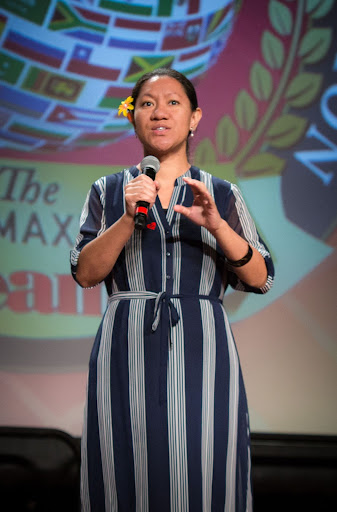
Katrina Fatiaki is our first Professional Fellows Program Oceania (PFP Oceania) from Tonga where she was attached to us for one month. Katrina has more than 15 years of training, research, evaluation, and program management experience in the Pacific. Currently, she is the owner and lead consultant for Tapuaki Mei Langi Consultancy based in Tonga with core services in human rights and gender project design and delivery support. Katrina is also a certified trainer, coach, and speaker in the field of leadership and human rights, with advanced communication skills in negotiating and advocating for the realization of human rights, good governance, and gender equality.
How are you involved with ICAAD?
During my time at ICAAD I have been doing a number of things from working on the Universal Period Review (UPR) Tonga Stakeholders submission for ICAAD with focus on gender-based violence recommendations. I also had a chance to review ICAAD’s Human Rights Education course and created a 5-minute video sharing my experience ‘Navigating change as a Tongan woman and human rights advocate.’
I have also been looking at ways where ICAAD could support the work I am doing with returnee’s rights in Tonga. So there is a potential partnership early next year to support research and training in tracking gender-based violence in Tonga, and improving access to justice in gender based violence cases.
This is something I am excited about in looking at ways to strengthen the work for the NGO that I am a board member of called Dare to Dream, founded by five returnees. There’s so much work that needs to be done and I know that this future collaboration looks promising to building our database and documenting the journeys of the returnees.
What motivates your advocacy efforts? And Who or what inspires you?
I am motivated by my values, one is faith which influences me in showing love and making a difference in all that I do without being judgmental. Servanthood is my second value, and so it’s always reminding myself that it’s about putting others first and following through your advocacy plan. I am only a vessel to plant the seed of change but it is about others not about me.
When I was a Student editor for the University of the South Pacific’s Student newspaper called ‘Wansolwara’ I remember going back home to cover the 2006 riots in Tonga. I was given a permit to enter Nuku’alofa and it was like walking in a ghost city. It made me sad walking through town at the time, empty, burnt to ashes and I recall seeing graffiti on the walls saying ‘for human rights.’ So I did ponder on that, which later inspired me to do further studies in pursuing a Masters in Human Rights.
My parents have always inspired me in my advocacy work, especially my mum. My mother has always been a voice of reason and has challenged traditional systems in Tonga and discriminatory practices. So this has always inspired me in my work.
What is an important lesson that you’d like to share with other human rights advocates?
I want to share the three A’s which I believe will help any advocate in making a difference. The first A is Awareness. This implies an openness, an understanding of all the things happening right now in your life. In the work I do, I have learnt to lean in more and listen, awareness is not common-sense I realize. It is a diagnosis and soul searching that you must do to be conscious with your own behavior. You can be a very qualified person but lack awareness of how toxic your behavior may be. I work with a group of returnees in Tonga and they always remind me to hone into their worlds to understand them before looking at solutions. Being aware connects you to gain respect and loyalty.
The second A is Anticipation. During challenging times, you should trust your intuition. Women have a sense of intuitiveness and a sense of timing BUT remain hopeful. As an entrepreneur I have learnt to take risks and make decisions based on my intuition and this links to the value of commitment that I also believe in.
The last A is Agility. This is so you can be flexible and adapt to change. If Plan A fails, go for Plan E, learn to embrace failure when planting that seed of change but this must come with humility and not always thinking you know it all. This is how to navigate the global pandemic and the post Covid-19 period, to give you some certainty in your calling to make a difference wherever you are.
Anything else you want to add?
I am grateful for the opportunity to be attached with ICAAD, the team is amazing also. I love the hybrid approach to work which gave me an opportunity to also explore and enjoy New York City whilst being here.
